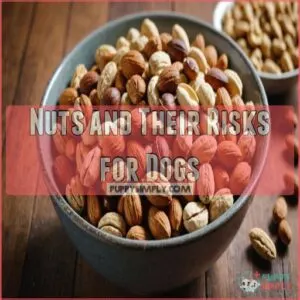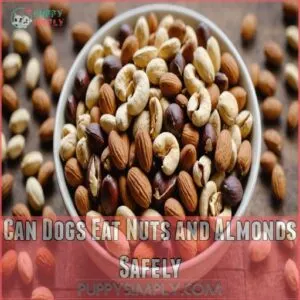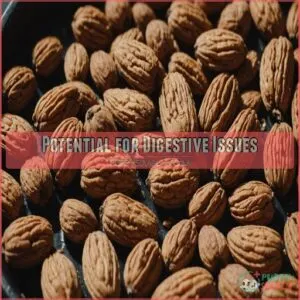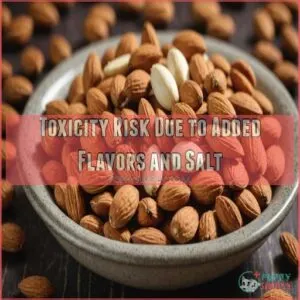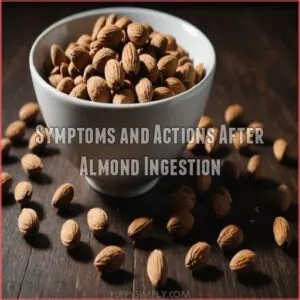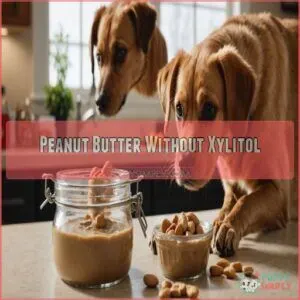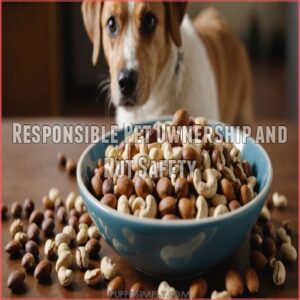This site is supported by our readers. We may earn a commission, at no cost to you, if you purchase through links.
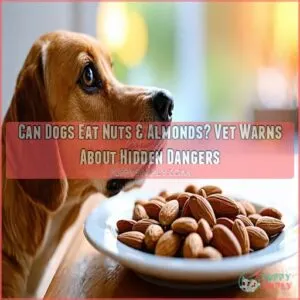 You’re wondering if dogs can eat nuts like almonds.
You’re wondering if dogs can eat nuts like almonds.
Generally, it’s best to steer clear.
Almonds pose a choking hazard and can upset your dog’s stomach, especially those seasoned with flavors or salt.
While peanuts or cashews in moderation might be okay, almonds aren’t ideal due to their shape and potential for causing digestive issues.
Nuts can also lead to weight gain and pancreatitis in dogs.
So, if Fido’s giving you that irresistible puppy-eye look at snack time, you might want to toss him a carrot instead.
Curious about other safe treats or what to do if he sneaks an almond?
Read on!
Table Of Contents
- Key Takeaways
- Nuts and Their Risks for Dogs
- Can Dogs Eat Nuts and Almonds Safely
- Risks and Dangers of Almonds for Dogs
- Symptoms and Actions After Almond Ingestion
- Safe Alternatives to Nuts for Dogs
- Responsible Pet Ownership and Nut Safety
- Frequently Asked Questions (FAQs)
- Can dogs eat almonds?
- Can dogs eat cashews and almonds?
- Can dogs eat salted nuts?
- Can dogs eat almond milk?
- What nuts can dogs eat?
- What happens if my dog eats almonds?
- Are almonds and cashews ok for dogs?
- Can dogs eat pistachio nuts?
- Can almonds improve a dogs coat health?
- How do almonds affect a dogs dental health?
- Are almond allergies common in dogs?
- Do roasted almonds pose extra risks?
- How many almonds can cause toxicity?
- Conclusion
Key Takeaways
- Almonds aren’t toxic, but they’re a choking hazard and can upset your dog’s stomach.
- Many nuts are high in fat and calories, potentially causing weight gain and pancreatitis.
- Avoid nuts with added salt, flavorings, or artificial sweeteners; these are toxic to dogs.
- Offer your dog safer alternatives like fruits, vegetables, or unsalted peanut butter.
Nuts and Their Risks for Dogs
You’ll want to think twice before sharing your nutty snacks with your dog, as many nuts can cause serious health problems ranging from choking to severe toxic reactions.
While your furry friend might give you those irresistible puppy eyes at snack time, nuts can trigger weight gain, pancreatitis, and digestive issues in dogs.
Weight Gain and Pancreatitis
Your pup’s wagging tail might make those puppy eyes hard to resist, but feeding nuts can lead to serious health issues.
High in calories and fat, nuts can quickly pack extra pounds on your furry friend.
Even worse, the rich fat content may trigger pancreatitis – a painful inflammation of the pancreas that often requires emergency vet care and can be life-threatening if left untreated.
Choking Hazard and Toxicity
Nuts can turn a playful pup’s snack into a serious hazard.
These bite-sized morsels pose significant choking risks, especially for smaller dogs who mightn’t chew thoroughly.
Additionally, some dogs may have specific allergies, such as a dog almond allergy, which can be managed with the right products dog almond allergy solutions.
Beyond the immediate choking danger, certain nuts like macadamia and black walnuts pack a toxic punch.
They can trigger severe symptoms including tremors, muscle weakness, and even seizures.
Keep these risky treats far from your furry friend’s reach.
Harmful Additives and Gastrointestinal Upset
Many store-bought treats contain harmful additives that can upset your dog’s stomach.
Beyond the nuts themselves, processed varieties often pack dangerous ingredients that spell trouble for your furry friend.
For instance, some nuts like peanuts can be safe for dogs in moderation, such as unsalted peanut options.
Here’s what to watch for:
- Salt levels that exceed safe limits for dogs
- Artificial sweeteners, especially toxic xylitol
- Seasonings like garlic and onion powder
- Chemical preservatives that trigger digestive issues
Better stick to nut-free treats made specifically for dogs.
Can Dogs Eat Nuts and Almonds Safely
You’ll want to be careful about which nuts you share with your furry friend, as some varieties like macadamia nuts and walnuts can make your dog seriously ill.
Plain peanuts and cashews can be safe occasional treats for your dog.
While these high-calorie snacks can quickly lead to weight gain and digestive issues, you’ll need to watch the portion sizes.
Safe Nuts Like Peanuts and Cashews
While it’s true that most nuts aren’t safe for dogs, peanuts and cashews can be healthy treats when served properly.
Roasted, unsalted peanuts offer proteins and vitamins that support your pup’s coat health and digestion.
Cashews pack omega-3s and antioxidants for added benefits.
Just remember to serve them in moderation – think of them as special rewards rather than daily snacks.
Dangerous Nuts Like Macadamia and Walnuts
Your furry friend’s health could be at serious risk from certain nuts.
Macadamia nuts are highly toxic, causing tremors, coordination loss, and fever in dogs.
Both black and English walnuts harbor dangerous molds and mycotoxins, while black walnuts contain juglone, a substance that triggers seizures.
Keep an eye out for symptoms like tremors, fatigue, and excess salivation – they’re red flags that require immediate vet attention.
Calorie Content of Different Nuts
Beyond the dangers of toxic nuts, calorie content presents another key concern for your dog’s health.
It’s also essential to remember that some nuts, like almonds, can cause vomiting, diarrhea, gas, and obstruction in a dog’s digestive system, as highlighted in guidelines for almonds for dogs.
A single ounce of pecans packs 196 calories – that’s about 20% of a medium-sized dog’s daily needs! Almonds contain 164 calories per ounce, while cashews have 157. Even dog-safe peanuts clock in at 161 calories per ounce, which can quickly contribute to weight gain and obesity.
Risks and Dangers of Almonds for Dogs
You’ll want to think twice before sharing your almond snack with your furry friend, as these nuts can cause serious problems ranging from choking to digestive issues.
While almonds aren’t toxic to dogs like macadamia nuts are, they’re still risky treats that can lead to stomach upset and potential health complications.
Especially when they’re flavored or salted.
Choking Hazard Due to Size and Shape
Many dogs struggle with almonds due to their problematic size and shape, creating serious choking risks that can quickly turn dangerous. Here’s what makes almonds particularly risky:
- The almond’s oblong shape can lodge in your dog’s throat
- Small breeds face higher risks with standard-sized almonds
- Broken pieces create sharp edges that can cause injury
- Dry almonds are harder to swallow than other treats
- Multiple almonds eaten quickly increase choking danger
Potential for Digestive Issues
Dogs struggle to break down almonds in their digestive system, leading to uncomfortable bloating and potential health issues. Even a few almonds can trigger problems in sensitive pups.
| Symptom | Mild Case | Severe Case |
|---|---|---|
| Bloating | Slight discomfort | Severe pain |
| Digestion | Slower than usual | Complete blockage |
| Recovery | 24-48 hours | Veterinary care needed |
Watch for signs of distress – if your pup seems uncomfortable after sneaking some almonds, it’s time for a vet visit.
Toxicity Risk Due to Added Flavors and Salt
Store-bought almonds often come packed with dangerous additives that can harm your furry friend.
Even seemingly innocent seasonings can pose serious health risks.
You can find a variety of garlic almond products online, but these aren’t safe for dogs.
Here’s what makes flavored almonds particularly dangerous:
- Salt content can lead to sodium poisoning and dehydration
- Garlic and onion flavorings are toxic to dogs’ red blood cells
- Artificial sweeteners, especially xylitol, can cause severe hypoglycemia and liver failure
Symptoms and Actions After Almond Ingestion
If you’ve caught your dog snacking on almonds, you’ll want to watch for signs like vomiting, diarrhea, or unusual lethargy in the next few hours.
Contact your vet right away if your dog shows any of these symptoms, especially if they’ve eaten flavored or salted almonds.
Vomiting and Diarrhea
When your furry friend consumes almonds, you’ll want to watch for signs of digestive distress.
Vomiting and diarrhea often appear within 4-24 hours of eating nuts, signaling your pup’s body is rejecting these difficult-to-digest treats.
| Symptom Severity | Action Needed | Time to Act |
|---|---|---|
| Mild | Monitor | 24 hours |
| Moderate | Call Vet | 12 hours |
| Severe | Emergency | Immediate |
| Persistent | Hospital | Same Day |
| Multiple | Emergency | Immediate |
Gas and Loss of Appetite
In addition to digestive troubles, your furry friend might experience uncomfortable bloating and gas after eating almonds.
You’ll likely notice them becoming less interested in their regular meals too.
While these symptoms might seem mild, they’re clear signals that almonds aren’t agreeing with your dog’s digestive system.
If your pup’s appetite doesn’t return within 24 hours, it’s time for a vet visit.
Lethargy and Other Signs of Ingestion
Your normally energetic pup’s sudden lethargy after eating almonds can be a red flag for nut toxicity, as it’s important to remember that nuts to avoid for dogs like macadamia nuts, walnuts, and almonds pose serious health risks.
Watch for telltale signs like muscle weakness, which might make your dog seem wobbly or uncoordinated.
Along with vomiting and diarrhea, you might notice unusual drooling, tremors, or elevated body temperature.
Some dogs may also experience temporary loss of appetite or appear unusually restless and uncomfortable.
What to Do if Your Dog Eats Almonds
If you spot your dog munching on almonds, don’t panic.
Start by checking how many they’ve eaten and saving the packaging.
For small amounts, monitor them closely for vomiting, diarrhea, or lethargy.
With larger quantities or flavored almonds, call your vet immediately – they might recommend inducing vomiting.
Keep the ASPCA Animal Poison Control number (888-426-4435) handy for emergencies.
Safe Alternatives to Nuts for Dogs
You’ll find plenty of safe, healthy alternatives to nuts that your dog will love, including fresh fruits, vegetables, and carefully selected seeds.
If you’re looking for a protein-rich treat, you can also offer your pup xylitol-free peanut butter in moderation.
Fruits and Vegetables as Healthy Options
Looking for safe treats after learning about the dangers of poppy seeds in baked goods, such as poppy seed muffins, after your pup’s close call with almonds?
Fresh fruits and vegetables make perfect alternatives.
Bananas offer potassium and natural sweetness, while watermelon keeps them hydrated on hot days.
Broccoli packs a vitamin-rich punch, and pumpkin supports healthy digestion.
These nutritious treats won’t just keep your dog safe – they’ll contribute to their overall health and happiness.
Seeds Like Sesame and Chia
Seeds offer a smart alternative to nuts for your furry friend.
Chia seeds pack a powerful punch of omega-3 fatty acids and fiber, while sesame seeds deliver calcium and antioxidants.
Sprinkle a small pinch on their regular food – think about a quarter teaspoon per 20 pounds of body weight.
These tiny powerhouses support everything from coat health to digestion, making them a tail-wagging treat option.
Peanut Butter Without Xylitol
Peanut butter remains a beloved treat for dogs, but you’ll need to check the label carefully.
Many brands now include xylitol, an artificial sweetener that’s toxic to your furry friend.
Stick to natural, unsweetened varieties and use them sparingly due to their high calorie content.
When choosing peanut butter for your pup, opt for brands that list peanuts as the only ingredient.
Responsible Pet Ownership and Nut Safety
You’ll need to keep a close eye on your dog’s access to nuts, as even seemingly harmless varieties can pose serious health risks.
Being a responsible pet owner means carefully selecting safe, healthy treats and keeping dangerous foods, including seasoned nuts and shells, safely out of your pet’s reach.
Avoiding Seasoned Nuts and Nut Shells
While fresh fruits make excellent treats for your pup, it’s time to talk about what to avoid. Those seasoned nuts sitting in your pantry might smell tempting, but they’re a no-go for your four-legged friend. Here’s why you should keep seasoned nuts and shells away:
- Nut shells can harbor dangerous molds and fungi
- Seasonings often contain toxic ingredients like garlic powder
- Salt levels in flavored nuts can lead to dehydration
- Shells pose serious choking and digestive risks
Choosing Safe and Healthy Treats
Choosing safe and healthy treats for your dog can feel like exploring a snack minefield.
Stick to these basics for happy pups and peace of mind.
If you’re looking for safe human food alternatives, consider checking out dog-friendly cake recipes. Check out homemade dog treats or explore treats for picky eaters.
Steer clear of human food dangers and always mind treat portion control.
Here’s a quick guide:
| Treat Type | Safe? |
|---|---|
| Homemade Biscuits | Yes |
| Human Snacks | No |
| Raw Carrots | Yes |
| Grapes | No |
| Dog-Specific Snacks | Yes |
Importance of Monitoring Your Dog’s Diet
Keeping an eye on your pup’s diet isn’t just about avoiding nuts.
It’s essential for dog food safety and managing pet allergies, especially with the rise of issues like dog nut allergy which can be addressed with the right products for dog nut allergy treatments.
Think of it like balancing a seesaw; too much of one thing can tip it over.
Maintaining a healthy weight means treating with moderation and understanding their dietary needs, securing a happy, energetic companion.
Frequently Asked Questions (FAQs)
Can dogs eat almonds?
Almonds aren’t toxic for dogs, but they can cause digestive issues and pose a choking hazard.
Many store-bought almonds have added flavors and salt, which aren’t healthy for your pup.
It’s best to avoid giving them almonds.
Can dogs eat cashews and almonds?
Let’s get nutty! Cashews are generally okay, but almonds? They’re a bit tricky. While not toxic, they’re hard to digest and can be a choking hazard. Best to skip them.
Can dogs eat salted nuts?
Feeding your dog salted nuts isn’t a great idea.
They can lead to dehydration and sodium ion poisoning.
High salt levels aren’t healthy for dogs, potentially causing vomiting, diarrhea, tremors, or even seizures.
Stick to unsalted!
Can dogs eat almond milk?
Dogs can generally have almond milk in small amounts.
It should be unsweetened and without additives like xylitol, which is toxic to dogs.
Keep an eye out for any signs of digestive upset.
What nuts can dogs eat?
You’re looking for a list of safe nuts for your furry friend.
The good news is that peanuts and cashews are generally safe for dogs, but be sure to serve them roasted, unflavored, and unsalted.
What happens if my dog eats almonds?
If your dog eats almonds, they might face digestive issues like upset stomach, vomiting, or diarrhea.
Although not toxic, almonds are hard to digest and can pose a choking risk, especially for smaller dogs.
Are almonds and cashews ok for dogs?
Almonds and cashews aren’t ideal for dogs.
Almonds can be hard to digest and pose a choking risk.
Cashews should be given sparingly, as they’re high in fat and may cause stomach upset or pancreatitis.
Can dogs eat pistachio nuts?
Ironically, pistachios aren’t a pup’s best friend.
High in fat and calories, they can cause tummy troubles, even pancreatitis.
A tiny treat’s okay, but moderation’s key for your furry pal.
Stick to safer snacks!
Can almonds improve a dogs coat health?
You’re hoping to boost your dog’s coat health, but almonds aren’t a good choice.
Dogs struggle to digest almonds, potentially causing stomach issues without improving their coat.
Consider safer alternatives like fish oil or well-formulated dog food.
How do almonds affect a dogs dental health?
Barking up the wrong tree with almonds and dog dental health, they don’t clean teeth and can cause choking or blockages.
The hard texture might lead to tooth damage.
Opt for dental chews designed for dogs instead.
Are almond allergies common in dogs?
Dogs can experience almond allergies, but they’re not as common as you might think.
Symptoms include itching, swelling, vomiting, and diarrhea.
If your pooch reacts after eating almonds, it’s best to consult your vet promptly.
Do roasted almonds pose extra risks?
Roasted almonds increase the risk for dogs due to added salt and flavors, which can be harmful.
They’re also a choking hazard and hard to digest, potentially causing gastrointestinal issues.
Stick to safer alternatives like peanuts.
How many almonds can cause toxicity?
Just a handful of almonds can upset your dog’s stomach.
While not typically toxic, almonds can trigger digestive issues due to their difficulty in digestion.
It’s best to avoid them entirely to keep your pet safe.
Conclusion
Imagine a nut-shaped minefield for your pooch’s health—consider this when pondering, "can dogs eat nuts almonds?"
Nuts like almonds aren’t the safest bet, posing risks of choking, digestive issues, and unwanted additives.
Instead, treat your furry friend with safer options like fresh fruits or veggies.
Remember, a carrot can delight just as much without the risk.
For your dog’s well-being, steer clear of nuts and opt for healthier, pet-friendly snacks.
Your pup will thank you!

